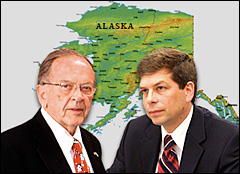
Sarah Palin isn’t the only Alaskan in a hot race this election season. Enviros are also closely watching the state’s Senate race, which has incumbent Republican Ted Stevens up against Democrat Mark Begich, the mayor of Anchorage.
Stevens cruised to an easy victory in the Republican primary last month, winning 63 percent of the vote in an election with six challengers — despite the fact that he was indicted by a federal grand jury in July. Stevens will be in court in Washington, D.C., next week to face seven felony charges that he made false statements on his financial disclosure forms between 1999 to 2006 in order to conceal gifts and in-kind services from the oil-field engineering firm VECO Corp. and its CEO.

At 84, Stevens is the longest-serving Republican in the Senate. He’s been a thorn in the side of environmentalists for much of his time in Congress — particularly when leading the charge to open the Arctic National Wildlife Refuge to oil and gas exploration — though on rare occasions he’s also pleasantly surprised enviros. Stevens has questioned whether humankind is warming the planet, and offered his own bizarre explanations for climate change. Yet as far back as 2002, he has recognized the severe impact global warming is having on his home state: “Alaska is harder hit by global climate change than any place in the world,” he told The New York Times. And in 2007, he cosponsored a moderate climate bill and introduced legislation to raise fuel-economy standards for passenger cars to an average of 40 miles per gallon within 10 years.
Stevens has aggressively pushed for more logging in the Tongass National Forest in southeast Alaska. He’s also been a staunch advocate for his state’s fishing industry, sometimes to the detriment of marine ecosystems: He attempted to prevent the federal government from spending money to study and protect fish habitat in the North Pacific; he tried to weaken organic-labeling standards so wild Alaskan salmon could get the organic seal; and he tried to get the Steller sea lion off the endangered-species list so the feds wouldn’t have grounds for cutting fishing quotas in the animal’s range.
His challenger, Begich, also advocates drilling in the Arctic Refuge, which is sure to ruffle enviro feathers, though it’s par for the course among Alaskan politicians, regardless of party affiliation. But Begich is also a proponent of alternative energies, calling for a national renewable-energy standard of 25 percent by 2025 and efficiency improvements to reduce energy consumption 25 percent by 2018. He’s also bullish about wind and hydropower in his home state. “We have a lot of potential that we have barely begun to touch,” he told Grist in a recent interview.
Begich lists climate change as a top issue in his campaign, and calls for a cap-and-trade system to reduce greenhouse-gas emissions 80 percent by 2050. “Alaska is ground zero for the effects of climate change,” said Begich, who emphasizes that climate policy should include adaptation strategies for places like Alaska that are already feeling the effects. Stevens has accused Begich of aligning himself with “extreme” environmentalists.
Begich has served as the mayor of Anchorage since 2003, and is the son of U.S. Rep. Nick Begich, who disappeared in a 1972 plane crash while flying from Anchorage to Juneau for a political fundraiser. Stevens has been reelected by comfortable margins ever since he came to the Senate in 1968, but Democrats think Begich has a good shot of knocking him out this time around.
The race is tight. Begich was ahead in the polls for most of the summer, but Stevens now appears to be closing the gap; a recent poll found Begich with 48 percent support and Stevens with 46. Some analysts are hypothesizing that the addition of Gov. Sarah Palin to the GOP presidential ticket might give Stevens a boost.
The wild card is Stevens’ trial on corruption charges, set to start next week. While Stevens is tied up in court in Washington, Begich will be campaigning hard back home in Alaska. If Stevens is convicted, his name will still appear on the ballot in November. If he wins despite conviction, it would be up to his Senate colleagues to decide whether he’s qualified to serve; if two-thirds voted against him, he could be expelled. If Stevens were expelled or chose to resign, the state would hold a special election to replace him. So no matter how it all shakes out, this is sure to a dramatic race.

